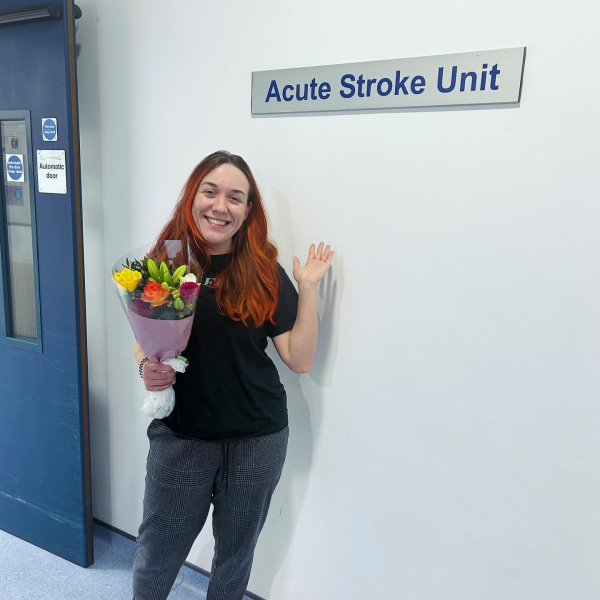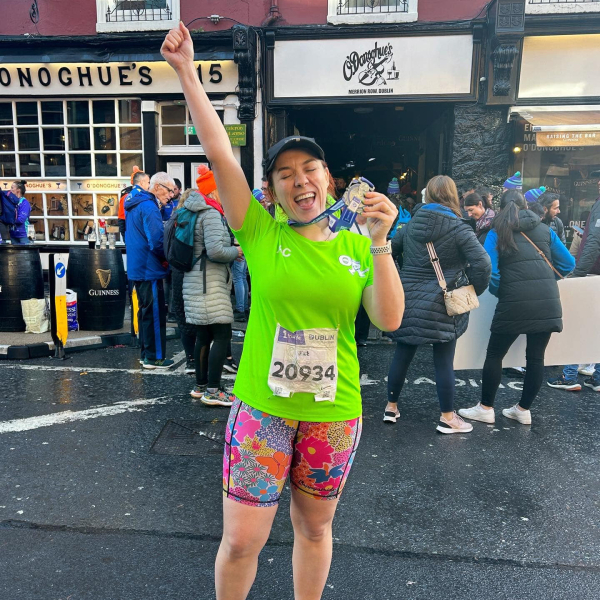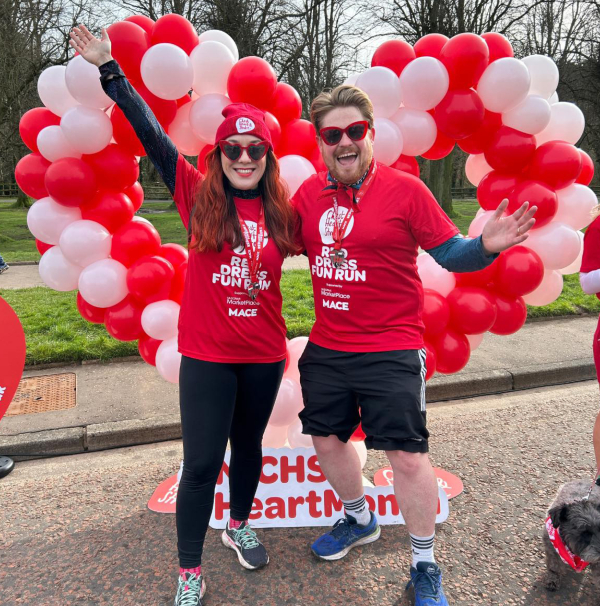
World Stroke Day will be observed on Tuesday (29th October) and leading local health charity, Northern Ireland Chest Heart & Stroke (NICHS), is using the day to put a spotlight on this serious, often life changing, condition.
Alice Cinnamond, from Belfast, had a sudden stroke at just 29 years old and she is speaking out to raise awareness that stroke is not something that only affects older people, it can happen to anyone, at any age.
Alice recalls, “It was a very normal day. When I came home from an evening out, I suddenly couldn’t see properly. I thought I had something in my eye but it was late so I went to bed and hoped it would be better in the morning.”
“The next morning, I felt exhausted, but I had a wedding to attend. I had a lovely day even though I still couldn’t see properly and had a slight headache. I didn’t think too much about that, I was more worried about my vision as it wasn’t showing any signs of getting better.”
“On the third day, I had an emergency appointment with an optician, and they then booked an appointment for me at the Eye Casualty clinic at the Royal Victoria Hospital in Belfast. The clinic is closed over the weekend, so I was going to have to wait until the Monday morning for that appointment, but I knew something wasn’t right and I visited A&E on the Saturday. The A&E doctor couldn’t find anything wrong, but I wasn’t convinced so I went to the Eye Casualty clinic as planned on the Monday. There, I was checked, tested, and scanned as quickly as possible, and was then told I had suffered a stroke which was a complete shock.”

“Overall, it took around five days for my stroke to be diagnosed. The diagnosis was a big surprise for me and even for some of the staff. The medical staff at the Royal Victoria Hospital were fantastic however and I can’t thank the doctors and nurses enough.”
“I didn’t know you could have a stroke in your twenties. I didn’t really understand what a stroke was, how it happened, and what impact it might have on my future. It was all very worrying.”
Back at home Alice started her recovery journey, but the impact of the stroke was life changing. She explains, “Post stroke, my lifestyle completely changed. I was 29 years old, just recently married. I loved my job as a designer. I was working hard in my career, and I had just completed the Dublin Marathon two weeks before my stroke. I was the healthiest I have ever been. I was doing what the doctors always recommend - regular exercise, eating healthily, not smoking, and not drinking too much alcohol. After more investigation it was discovered that I have a Patent Foramen Ovale (PFO). This is a hole in the heart, and it is likely this caused my stroke.”
“After my stroke I suffered from very bad fatigue and vision issues. I have tried my best to be respectful of the recovery that my brain injury needs. Rest and sleep have been my top priorities. Some days were easier than others as I tried to get back to my normal schedule. Socialising and active days were very overstimulating and exhausting. It was important for me to rest. I was worried about not feeling normal again but after 11 months of recovery, I’m feeling grateful that I’m back living a full and youthful life.”
“For my recovery I implemented small tasks each week. To help my eyesight I was advised to put my phone down and to pick up reading a book instead which I fell in love with. Keeping active is very important to me as it’s great for your body but also your mental health. I worked on my endurance again from short walks around the block to progressively longer walks. Then gently introducing 5km jogs and park runs back into my routine. I did have to balance it with rest days as stroke fatigue is very much a real thing. It’s no joke.”
“My stroke didn’t present with the most common symptoms such as facial drooping, arm weakness, and slurred speech difficulties. After my stroke, my ability to visually process information was impacted. It was difficult to see, and this affected my ability to do daily tasks like reading, watching TV, going to the shops, and crossing roads when I was out walking. Throughout my recovery I have suffered from a lot of fatigue and migraines, and it impacted my day-to-day routine. However, I am feeling extremely positive as my vision is 99% back to normal and I am feeling less tired each day. I am confident I will make a full recovery as I’m mostly back to my usual self after 11 months.”
After returning home from hospital, Alice received a visit from Northern Ireland Chest Heart & Stroke (NICHS) as part of the charity’s Family Support service. Alice says, “They were very positive and supportive of my recovery. They have called me to check in and I attended one of their Young Stroke Support groups. It is reassuring talking to someone who understands what you are going through. To support the charity’s work my husband and I walked their Red Dress Fun Run event in February which was a great day out. I plan to run another marathon in the future to raise money for NICHS so watch this space!”

What advice would Alice share with others who are in a similar situation? “It is important to be kind and patient with yourself. This is easier said than done, some days will be tricky. You will see progress, but it takes time. It is important to have good friends and family who you can talk to. You are not alone in this. Reach out to NICHS to see which of their support services might be of benefit to you.”
“Pre-stroke I completely undervalued the power of rest. Sleep is a magical healer for your brain, get as much of it as you can. You are not being lazy! You are actually being proactive and helping your recovery. Rest your eyes, lie down, take a 20-minute nap, whatever you can. It all helps!”
Ursula Ferguson, Director of Care Services at Northern Ireland Chest Heart & Stroke explains, “We are very grateful to Alice for sharing her story in support of World Stroke Day and our charity. Having a stroke is a life-changing reality for thousands of people in our local community every year and people may also be surprised to learn that 50% of stroke survivors in Northern Ireland are under 75.”
“No two strokes are the same and the impact can be devastating. As well as the negative impact on physical wellbeing, stroke can reduce independence, confidence, and happiness. Stroke can also affect relationships, take away jobs and careers and render some families isolated within their own homes- but NICHS is here to help with expert care and support.”
“The help available from our Care Services team is extensive and as Alice highlighted includes family support, physical activity programmes, health education programmes, wellness sessions, young stroke groups, and practical and emotional support.”
“Our team works across Northern Ireland with people of all ages affected by stroke, alongside their families and carers. They are dedicated to supporting people in adjusting to life with a stroke condition, helping them to enjoy life to the full, re-engage with hobbies, and improve their confidence, independence, and overall quality of life.”
Ursula continues, “Our work is only possible however because of the generosity of the public and we are extremely grateful for this. Almost 90% of our income comes from public donations. These funds are essential in enabling us to continue to support the local community and provide life-changing services.”
If you have been affected by stroke visit https://nichs.org.uk/strokesupport for further information about NICHS’s stroke support services.
